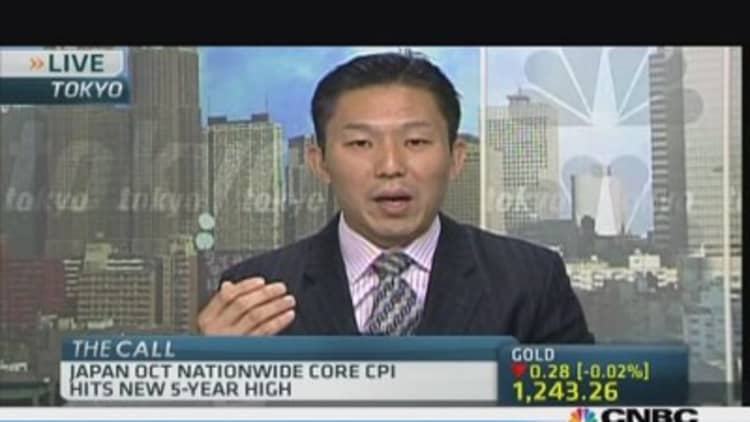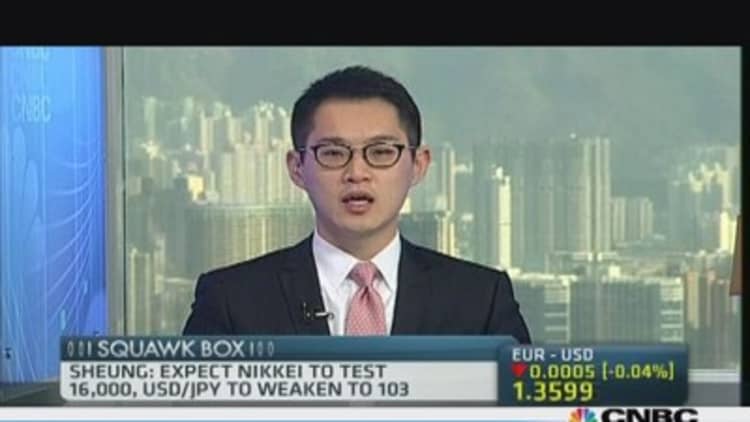
Data showing inflation in Japan hit a new five-year high in October is news to cheer for sure. But it may take more monetary stimulus for inflation to hit the levels the Bank of Japan wants to see, analysts say.
Japan has stepped up efforts this year to win a battle against deflation that has dogged its economy, the world's third biggest, for two decades.
(Read more: Japan's economic growth slows in Q3)
Japan's core consumer price index (CPI), which includes oil products but excludes prices of fresh food, rose 0.9 percent in October from a year earlier, compared with a 0.7 percent rise in September, and marking its biggest year-on-year growth since November 2008, data on Friday showed.
The CPI, when oil and food prices are stripped out, rose 0.3 percent from a year earlier. That was the biggest year-on-year gain since August 1998, a government official told Reuters.
"The number you want to look at is nation-wide core CPI. It's very incremental, they are heading in the right direction but overall, it is a low number," Chris Tedder, research analyst at FOREX.com told CNBC Asia's "Squawk Box."
"In the grand scheme of things, there's going to be a need for more action from the BOJ to get to its 2 percent inflation target. While the number is positive, we look into the long term," he said.
In April, the BOJ said it would pump $1.4 trillion into the economy to help boost inflation to 2 percent over a two-year period.
(Read more: Bank of Japan keeps hefty stimulus in place)
"If the BOJ has promised 2 percent inflation and getting to that level is more important than the direction, then it could decide that further stimulus is warranted next year," said Long Hanhua Wang, an economist at RBS in Tokyo.

Stephen Sheung, head of investment Strategy at SHK Private in Hong Kong, expects more monetary stimulus next year to buffer the impact on the economy from a rise in Japan's consumption tax, due to take place in April.
"In the short-run we believe the can run up the 16000 level and the yen can go to 103 [versus the dollar]. But before that, we think the BOJ will expand its monetary stimulus in the second or third quarter of next year," he said.
"What we see is that the consumption tax increase around Easter next year will hit consumption and the economy. And unless the BOJ drops the 2 percent inflation target for the end of next year, there's no option but to increase the stimulus," he added.
The Nikkei hit a six-year closing high on Thursday at 15,727, lifted by better-than-expected retail sales data.
(Read more: Nikkei surges to six-year closing high)
Other data on Friday added to evidence of a recovery in the Japanese economy.
Household spending rose 0.9 percent in October from a year earlier, while industrial output rose 0.5 percent last month from September – a second consecutive rise but below forecasts in a Reuters poll from a 2 percent increase.
"The industrial output data was lower than expected. A driver of output is electrical machinery and that has been sluggish in recent months, but this has now turned up and that is positive," said Wang at RBS.
—By CNBC.Com's Dhara Ranasinghe; Follow her on Twitter @DharaCNBC


